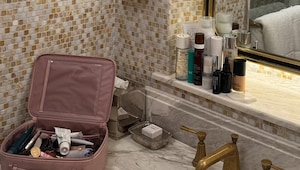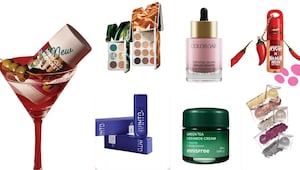The Ultimate Exfoliation Guide For Acne-Prone Skin
How much, how to, how often; you've got questions—we have the answers.

Exfoliation is a prerequisite for fabulously flawless skin. However, in the quest for achieving a spotless, glass-like appearance, those battling active breakouts must tread carefully. "Exfoliation can be a particularly tricky business for those who possess acne. The slithering process, which helps make way for a fresh new epidermis layer, is relatively slow in those with such a skin type. And while this integral step must be a part of your weekly skincare routine, acne-prone skin requires some extra TLC," explains Supriya Malik, Founder, Indulgeo Essentials.
Let's begin at the beginning...what is exfoliation?
"Exfoliation is the process that helps cut down the build-up of dead skin cells from the surface of our skin. Your skin cells demand regeneration, and it does so by slithering out of its old skin, making room for newer cells. However, at times, our skin tends to get lazy and does this job half-assed—ultimately clogging your pores and leaving behind pesky acne, blackheads, and dull, uneven skin. Therefore, regular exfoliation is crucial for getting rid of dead skin, encouraging cell turnover, preventing clogged pores, and helping even out the texture of the epidermis," Supriya adds.
So, should you exfoliate if you have acne-prone skin?
If you're looking for a yes or a no response—it's a yes. "Exfoliation, regardless of skin type, aids in the removal of dulling surface dirt, which entails ridding your skin off material that can clog pores and create a breeding environment for acne-causing bacteria," says Dr Swati Takkar, Cosmetologist, Derma Essentia. That said, one must solely exfoliate in the regions where there isn't any active acne; this would help slough off impurities, dirt and grime and unclog pores, which would prevent further breakouts.
How often should one exfoliate?
“When it comes to exfoliating acne-prone skin, less is more—cap exfoliation to 2-3 times per week. You must also use an exfoliant that is gentle yet effective," recommends Supriya. "Stop if your skin turns red or starts to peel and flake. Healthy skin cells may also be wiped away in the process, further causing irritation and redness. For acne-prone skin, chemical exfoliants such as salicylic and glycolic acid are ideal. Glycolic acid is an effective acne-exfoliant since it removes dull surface cells, giving way to increased smoothness and clarity," adds Dr Swati.
Supriya Malik makes a compelling case for using naturally-extracted exfoliators. "Naturally extracted exfoliating cleansers can be your skin’s surefire bet to effectively exfoliate and remove nasty impurities with low-irritant properties. Plus, such exfoliators offer prevention for spurring more acne. Dry exfoliating cleansers, ones power-packed with ingredients including Acai Berry, Maqui Berry, and Acerola Cherry, exfoliate the skin while treating acne and dryness. LHA (salicylic acid derivative)—the well-known cousin of AHAs and BHAs—is the new reigning queen when it comes to unclogging and minimising pores. Naturally extracted ACTIVs and acids do not imbalance the natural sebum production unlike strong AHAs and BHAs that strip away the natural oil from the skin and induce more oil production by tricking the skin into believing that it lacks hydration."
What if you over-exfoliate?
"If you've gone too rough too fast, your skin might feel itchy and inflamed. If so, switch over to an SOS routine with solid, skin-calming, pH-balanced products that hydrate, rejuvenate, and revive your skin. In such a case, using hyaluronic acid, squalane, shea butter, and ceramides would be a blessing; the following products will help dodge the adverse after-effects of over-exfoliation," posits Supriya Malik.
more from Beauty

I tried Pantene's Bond Repair Conditioner and here’s what it changed about my styling routine

I travel for a living—these are the top 15 tips I've learned to avoid skin freak-outs and overweight luggage

All the hottest beauty finds that make us sit up and take notice

Are we really rejecting people over zodiac signs instead of red flags?

Genius hack or pathway to loneliness? The dawn of dating’s spreadsheet era

Low-rise jeans are squeezing back into fashion—here’s how to wear them in 2026

Will we ever stop hating it when women propose to men?

Breezy summer outfits that keep you cool and effortlessly chic

Is Gen Z going analogue amid an epidemic of disconnection?

Are you an “echoist?”
